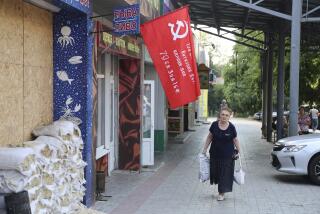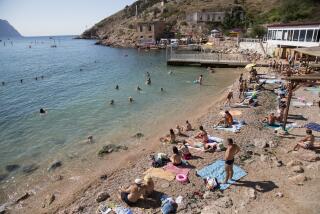Enclave Sees Economic Doom in Kremlin Policies
- Share via
KALININGRAD, Russia — Igor Zaretsky moved most of his business to neighboring Poland after President Vladimir V. Putin imposed customs barriers for this Russian enclave that forced him to buy wheat for his three bread bakeries from suppliers in far-off Russia.
The flour shipped in from Tambov, 875 miles away, not only was low-quality, it cost far more than flour next door in Lithuania or Poland and ate up his profits.
“Russia is beginning to close up and I’m afraid that soon Putin will close the western window in Kaliningrad,” Zaretsky said, echoing a growing chorus of Kaliningrad residents who fear Moscow’s centralizing policies will mean isolation and poverty for the Baltic outpost.
Since the Soviet Union disintegrated, about 1 million people in the Kaliningrad region have been cut off from Russia. They have felt even more alone since the entry of neighboring Lithuania and Poland into the European Union last year.
EU visa restrictions have complicated Kaliningrad’s contacts with its neighbors. And Putin’s government hasn’t decided whether to allow the territory to integrate with the EU, worrying that might spur independence sentiment here.
“Either we do what Moscow wants and isolate ourselves, or integrate with the EU structures and raise our standard of living. There’s no third way,” said Sergei Pasko, who with 200 like-minded associates started the Respublika social movement in February.
They want to hold a referendum on making Kaliningrad an autonomous republic within Russia, allowing it to harmonize its tax and customs laws with EU rules, conclude its own trade deals with the EU, deregulate trade and ultimately introduce the EU’s euro currency.
Earlier in February, Russian authorities shut down Pasko’s Baltic Republican Party, which had come out for making the territory a fully independent state.
“Moscow is in a panic over changes in the political relations between Kaliningrad and the rest of Russia and is acting like an ostrich, sticking its head in the sand,” Pasko said.
Putin wants to restore Russia as a great power, and the Soviet breakup and separatist wars in Russia’s Chechnya republic have made him leery of compromise on questions of regional autonomy. For the Kremlin, faster development in Kaliningrad than in the rest of Russia would spell danger, signaling other regions to resist growing centralization.
Moscow’s fears are fed by the city’s historical links to the West. Founded in 1255 by the Teutonic Order of knights, it was called Koenigsburg and was capital of Germany’s East Prussia until Soviet troops took it in 1945. Dictator Josef Stalin expelled ethnic Germans from the area and renamed the city in honor of a prominent Bolshevik, Mikhail Kalinin.
Although Putin’s wife, Lyudmila, was born in Kaliningrad, he thought a long time before signing a decree on celebrating the 750th anniversary of the city and the 60th anniversary of the Kaliningrad region this July.
“We hope that the celebration will push Moscow to change its position,” said Igor Rudnikov, a deputy in the regional legislature.
He said Kremlin policies were holding back Kaliningrad’s economic development. Its deep-water port should have become the commercial center of the southern Baltic, yet for 14 years no progress had been made on a development plan, he said.
The standard of living in Kaliningrad is a bit higher than in the rest of Russia but substantially lower than in neighboring countries. Its small salaries and location make for an ideal base for the Russian mafia, which traffics in drugs, immigrants and contraband.
Many more Kaliningrad residents, however, engage in what is called the shuttle trade: lugging a bag of cheap Russian cigarettes, vodka and sugar across the border to sell at a profit.
“Life in Poland and Lithuania has improved markedly and we’re obliged to pick up the crumbs from their European table,” said Natalia Zhilyado, a Russian language teacher who earns about $88 a month.
Kaliningrad Gov. Vladimir Yegorov declined to talk about the campaign to make the region autonomous.
But he argues that the region already is open for cooperation with the West. Two-thirds of its economic ties are with the EU.
Businessmen like Zaretsky, with his bakery chain, say Kaliningrad should strive for more. “I’ll be prepared to return to Kaliningrad only when they stop dictating the conditions of life here from the center.”
More to Read
Sign up for Essential California
The most important California stories and recommendations in your inbox every morning.
You may occasionally receive promotional content from the Los Angeles Times.













